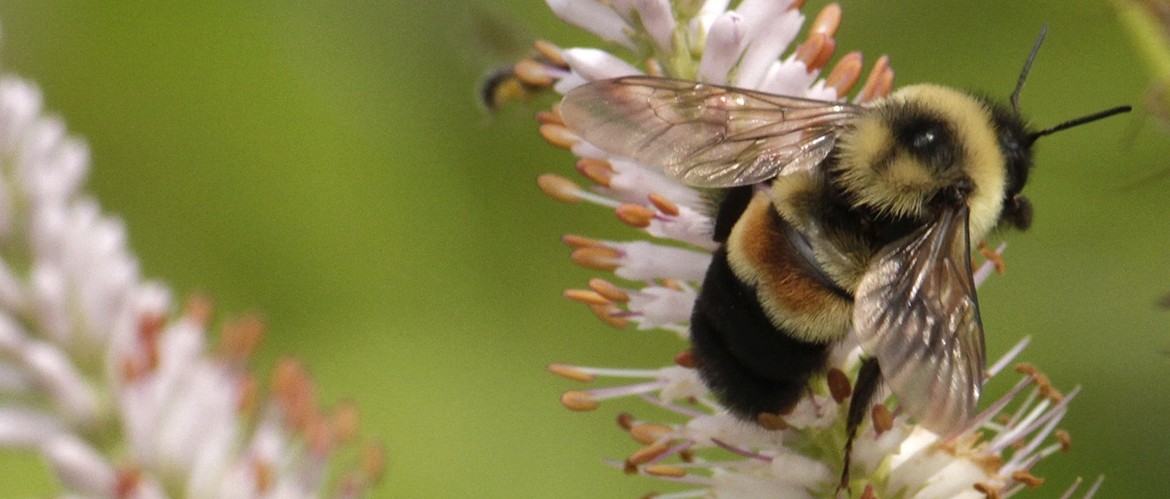CHICAGO (CN) — The Seventh Circuit signed the death warrant for an 8,000-year-old gravel prairie on Thursday morning, after it denied for the second time a petition to halt the expansion of a regional airport in northwest Illinois.
Known as the Bell Bowl Prairie and located on the property of the Chicago Rockford International Airport near the Illinois city of Rockford, it is among the last remaining such prairies in the Prairie State. It is also home to the critically endangered rusty patched bumblebee, an important pollinator for food crops like plums, apples and alfalfa.
The bee's historical range once spread over what is now the eastern United States and southeastern Canada, but it currently faces severe habitat loss. With the Seventh Circuit's repeat denials, that habitat loss in Illinois will only continue. Construction of a planned expansion to the airport's cargo operations began Thursday morning, with all but six of the Bell Bowl Prairie's original 25 acres on the chopping block.
"They started scraping the sod away this morning at 6 a.m.," said Kerry Leigh, executive director of the Natural Land Institute, the conservationist group which filed the petitions to halt the airport expansion. "It's already started."
The airport's $50 million expansion into Bell Bowl has been planned since 2019, part of a cargo boom driven by its close relationship with corporations like Amazon and UPS. It's one of the fastest-growing cargo hubs in the country; according to a 2022 report by engineering consulting firm Kimley-Horn, almost 2.4 billion pounds of goods moved through the Rockford airport in 2019 alone. This represents a 155% growth in landed air cargo weight over the preceding four years and translates into over $4.7 billion in revenue. The airport also employs over 8,000 people.
Construction on the expansion initially began in summer 2021, but halted that October after the Natural Land Institute filed a federal lawsuit seeking an injunction against the Greater Rockford Airport Authority, Federal Aviation Administration, U.S. Department of the Interior, U.S. Fish and Wildlife Service and Illinois Department of Transportation. Numerous federal officials, including Transportation Secretary Pete Buttigieg, were also named as defendants.
Prairie watchers had found rusty patched bumblebees, which the Fish and Wildlife Service added to the endangered species list in 2017, inhabiting Bell Bowl not long after excavators moved in, and the the Greater Rockford Airport Authority agreed to pause construction that October pending further environmental analyses. The government subsequently moved to dismiss the case for lack of jurisdiction in March 2022, a motion U.S. District Judge Iain Johnston, a Donald Trump appointee, granted in August.
The FAA gave the GRAA the green light to resume construction last Friday, prompting the Natural Land Institute to file an emergency petition to stay the bulldozers with the Seventh Circuit on Monday. The organization wrote in its petition that the rusty patched bumblebee relies on Bell Bowl Prairie "for its continued survival."
An appellate panel consisting of U.S. Circuit Judges Frank Easterbrook, Diane Wood and Michael Brennan – appointees of Ronald Reagan, Bill Clinton and Donald Trump, respectively – denied that petition on Wednesday night, in a single-page response that said the Natural Land Institute had "made no showing that a stay is appropriate under the relevant factors."
The group immediately filed a second petition requesting a rehearing before all the judges on the Seventh Circuit, which the panel again rejected in a single-page memo on Thursday morning. The panel did not offer any explanation for the second denial.
Leigh said Natural Land Institute volunteers and workers from the Fish and Wildlife Service are now in the process of moving sod from Bell Bowl to other nearby nature preserves in the hopes that the rusty patched queens will relocate with it. But she doesn't know how effective the effort will prove. At the same time, Leigh said she is planning to form a "legislative group to examine how the existing legal protections are failing us in the 21st century."
"The old ways of thinking still have a chokehold... we need to do away with the old ways of thinking before we can move forward," she said.
The FAA, for its part, said it would ensure contractors only performed the most ecologically disturbing work over the cold months, when the bees and other indigenous wildlife species are dormant.
“Chicago Rockford International Airport will retain more than six acres of the Bell Bowl Prairie. This includes more than three acres of high-quality prairie," the FAA said in a prepared statement. "Any excavation and shrub and brush clearing work in the project area will occur between October 15 through March 15 to avoid impacts to the rusty patched bumble bee and avoid the prime nesting seasons for the black-billed cuckoo and the upland sandpiper.”
For Leigh and other environmentalists who gathered in protest at Bell Bowl on Wednesday and Thursday, it's not nearly enough.
"I grieve the death [of the prairie]," said Frank Langholf, pastor of the local Trinity Lutheran Church, at a Wednesday evening press conference. "I grieve our own feelings... of 'what more can we do?' I don't know about you, but I feel like, well, there should have been something more. Something else we could have done."
About 60% of Illinois, roughly 22 million acres, was covered in prairie when European colonists first arrived, according to the Illinois Department of Natural Resources. Now only about 2,500 acres remain.
Subscribe to Closing Arguments
Sign up for new weekly newsletter Closing Arguments to get the latest about ongoing trials, major litigation and hot cases and rulings in courthouses around the U.S. and the world.









